Bus tour crosses boundaries of Aboriginal culture
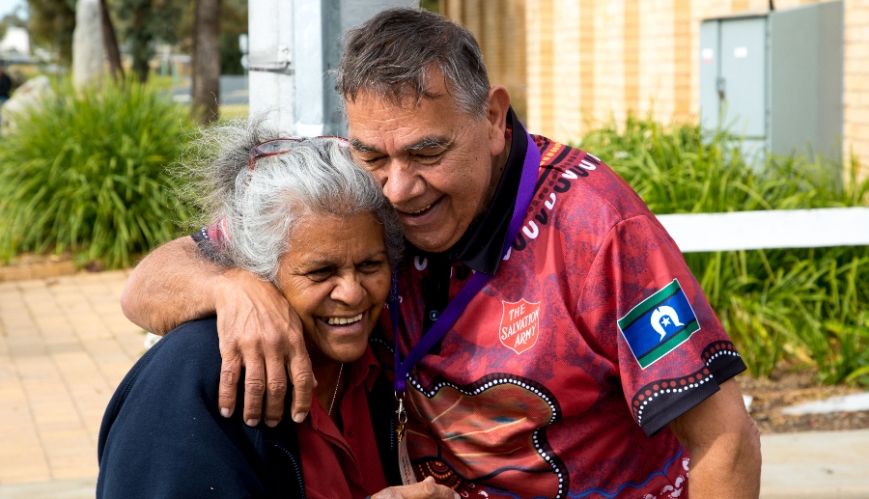
Bus tour crosses boundaries of Aboriginal culture
25 October 2017
Uncle Vince Ross with Elder Esther Kirby from Kerang, one of the towns visited by the Crossing Boundaries Bus Adventure during their "immersion" experience of Aboriginal culture.
An Aboriginal-led bus tour across country Victoria and NSW has helped 42 Salvationists embrace Aboriginal culture.
The Salvation Army has a long history with Aboriginal people, and the “Crossing Boundaries Bus Adventure” was organised to close the modern divide between Aboriginal Australia and The Salvation Army.
Tour guide, Uncle Vince Ross, who has been a Salvationist for 65 years, said the four-day trip in early October was all about building relationships through understanding lifestyle, culture, history and spirituality of the Aboriginal people. “Aboriginal people have known God for thousands and thousands of years,” he said. 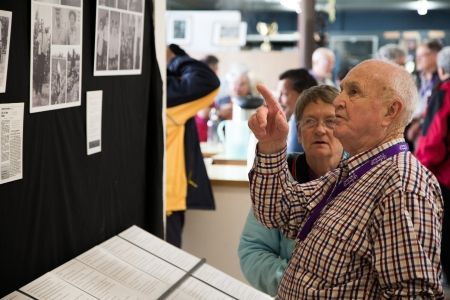
Uncle Vince encouraged delegates to “cross the borders” of traditional religious and theological thought and understand how Aboriginal people lived out and expressed their faith in God. He and his wife, Aunty Enid, did this by dropping in on friends, family and other connections throughout rural Victoria and NSW during the tour.
“I’ve had to walk on both sides of the fence – I’ve had to walk on the non-Aboriginal side, but also have to be true to myself as an Aboriginal person. I don’t always fit because I’ll always be thinking differently,” he explained.
“I’m always working outside of those boundaries and those borders, so this was ideal that we named this tour, ‘Crossing Boundaries’. We’ve taken these people into different areas where they’ve never been before.” 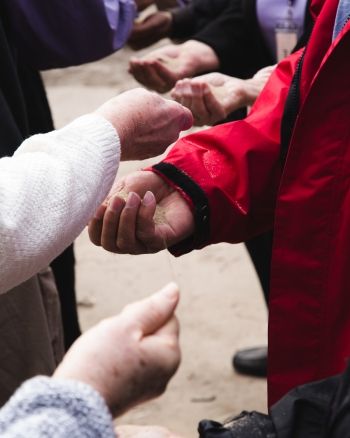
The 1250km tour took the group through Shepparton, Deniliquin, Balranald, Mildura, Swan Hill, Kerang and Bendigo. By stopping at various Aboriginal sites along the way, it gave participants the opportunity to engage with Aboriginal culture and to learn about the Army’s history of working with their people.
“It was an immersion experience,” said Major Marion Weymouth, a member of the National Aboriginal and Torres Strait Islander Reference Group. “Our emotions were stirred by past recollections of what we’ve done and why Aboriginal people were on a reserve in the first place.”
The group toured an elders’ facility at a nursing home in Shepparton, and learned from elders in Deniliquin and Kerang. Shirli and Christopher Congoo led the participants in a ceremony (pictured right) at Deniliquin Flats recognising people past and present who have lived there.
Their overnight stay in Mildura also allowed them to partner with Mildura Corps, enjoying community with people in the area and joining the corps for a Gospel Yarning Service on Sunday – a special style used in Aboriginal cultures.
“Yarning is a very special time for Aboriginal people,” explained Uncle Vince. “We say to non-Aboriginal people, ‘Come over to our side, and start to yarn with us. Get a sense of [our understanding of God]-the Creator Spirit we sometimes call Bunjil – Holy Spirit, what this is all about’.”
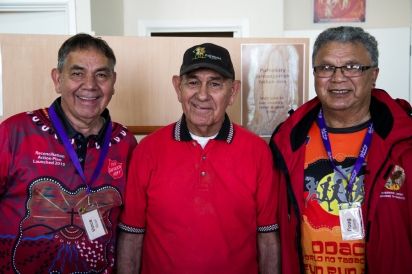 Uncle Vince with his brother Uncle John and Uncle Douglas Smith, who all grew up together on the Deniliquin Plain.
Uncle Vince with his brother Uncle John and Uncle Douglas Smith, who all grew up together on the Deniliquin Plain.
As part of the journey, the group stopped at the Deniliquin Flats, the site where Uncle Vince was raised and came to faith. Here, he was joined by his brother John, with and they discussed the work of the Army in the area, the separation of families due to the White Australia Policy, and what day-to-day life was like there 60 years ago.
Aunty Enid Ross also provided rich cultural insight during the trip, and Salvation Army historian Lindsay Cox gave background on the history of the Army.
Members of the Salvo Studios media production team also joined the tour to provide a permanent record of the event. These resources will be released early next year.
Commissioners Brian and Carolyn Morgan decided to go on the Crossing Boundaries trip to learn more about Aboriginal culture. They found the experience challenged the stereotypes and stigma associated with Aboriginal peoples during the 1950s and 60s. 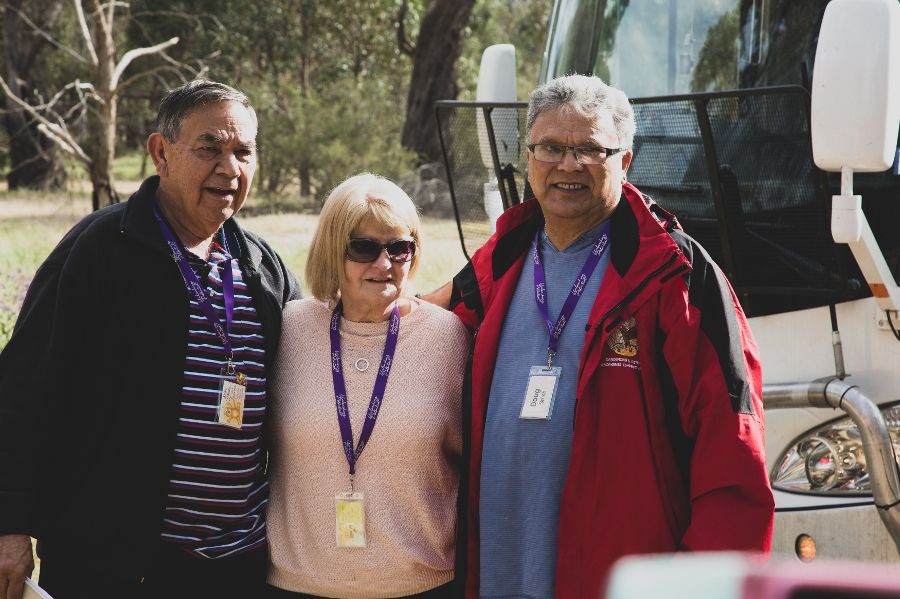 Uncle Vince pictured right with Marilyn Butler – whose parents were corps officers at Deniliquin when she was a child – and Uncle Douglas Smith.
Uncle Vince pictured right with Marilyn Butler – whose parents were corps officers at Deniliquin when she was a child – and Uncle Douglas Smith.
“The generation I’ve come from, we considered Aboriginal persons in the sense of always wanting to take things and to rely on other people for support,” said Colonel Brian. “What these days have done for me is to really educate me on the fact that these people were more givers than takers. Their culture was generous, was family-oriented, it reached out to non-Aboriginal people.”
Following a powerful time of prayer and reflection, Uncle Vince challenged each person to be an agent of change, prompting them to consider how they could further bridge the gap between Aboriginal Australia and the Army in their day-to-day lives.
Commissioner Brian said he experienced this very clearly during their time at Deniliquin.
“I got this strong conviction that The Salvation Army in Australia should be looking at a day of repentance about our attitudes and our lack of compassion to reach out to the indigenous person,” he said.
While the trip lasted four days, the impact of this deeply spiritual journey will have a lifelong effect on the participants, and hopefully, the Army as a whole.
“I’m really confident that these people will have had such a life-changing experience, [and will have gained] an awareness that you would not have picked up anywhere else,” said Uncle Vince
“I’ve commissioned them to be the change agents in the community. So that means you’ve got to pick it up. You’ve got to do something about it.”